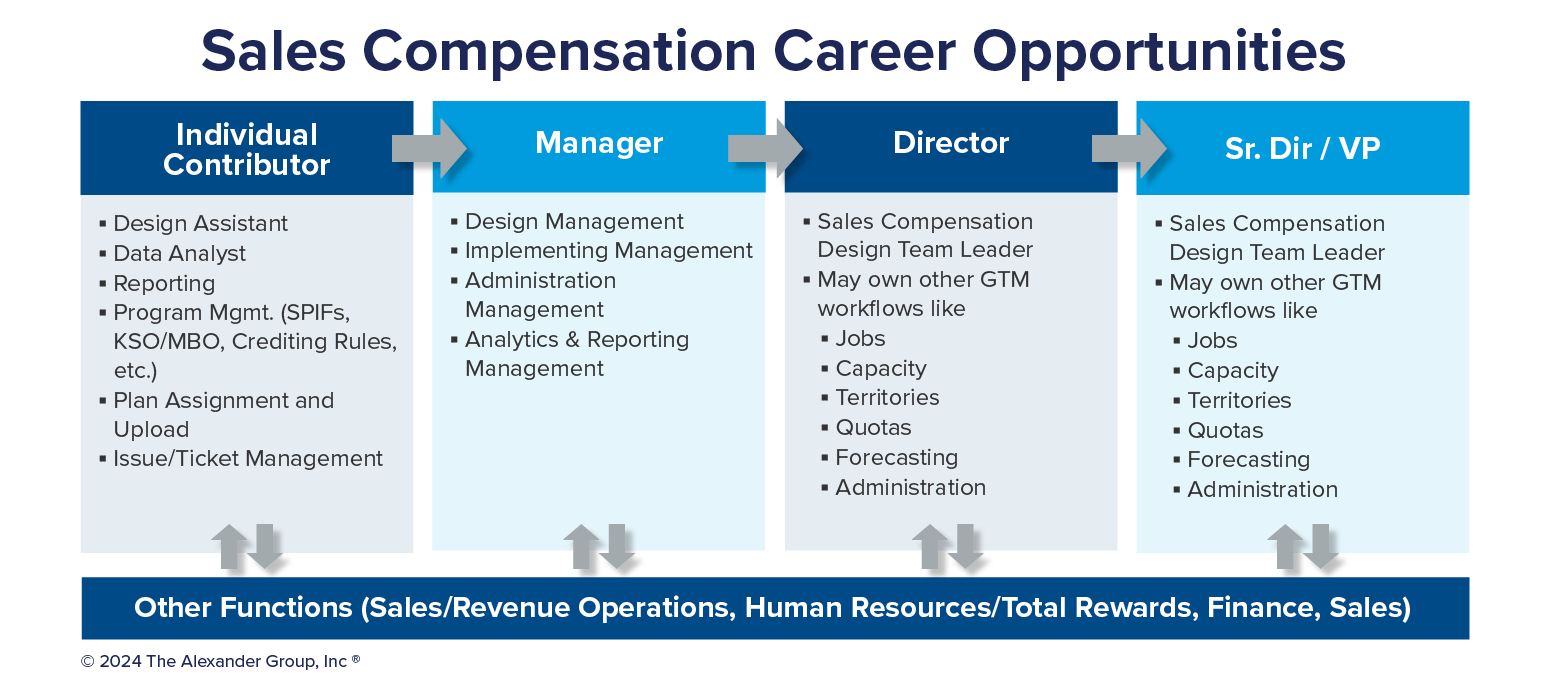For WorldatWork Members
- A Realistic Framework for Sales Performance Management Selection, Workspan Magazine article
- Rewarding the Modern Sales Organization, Workspan Magazine article
For Everyone
- 5 Keys: Using Incentive Comp to Lift Performance, Profits, Innovation, Workspan Daily article
- Maximizing Business Growth Through Strategic Sales Compensation, Workspan Daily article
- How to Choose the Right Incentive Plan for Your Sales Leader, Workspan Daily article
- Sales Compensation Course Series, course
Sales compensation is a critical part of any sales-driven organization, and the professionals responsible for its design and implementation are crucial to the success of the business. This article delves into the progression of a sales compensation professional, from an individual contributor to a manager and eventually a leader. It outlines the skills and responsibilities required at each level, highlighting the importance of:
- Understanding the business,
- Managing stakeholders,
- Building and utilizing strategic thinking, and
- Taking on more responsibility outside of sales compensation.

Individual Contributor
The most critical area every sales compensation professional should master is being the subject matter expert in sales compensation, getting familiar with key elements of sales compensation design and how those elements can impact individual and organizational performance. For example, it’s important to understand how changes to pay mix can impact sales representative earnings in tandem with the amount of pay at risk within the plan.
There are 10 core components sales compensation professionals should aim to become an expert in. These are critical to comprehensive sales compensation plan design.
- Sales compensation eligibility
- Pay levels
- Pay mix
- Leverage (upside)
- Measures and weights
- Mechanics and pay curve
- Performance and payout periods
- Quotas and targets
- Crediting and policies
- Special incentives
Another tool in the sales compensation professional’s toolkit is being able to make design decisions based on data — not only running the analysis itself but understanding what the data means. For example, it’s essential to be able to analyze annual sales rep performance and pay data to help evaluate how the current plan is performing and where potential areas are for improvement.
An additional area that individual contributors should understand is the compensation design process. This includes the actual design process itself, the annual compensation design calendar and what needs to happen once the plans have been finalized prior to being launched. Being aware of the annual sales compensation governance calendar will help the professional be more effective in driving the process to conclusion with enough time for the other functions to be able to incorporate and implement the new plan designs.
Manager-Level Skills
Transitioning to a management role introduces new skills and responsibilities for the sales compensation professional to own. In addition to being an expert on sales compensation design elements, the professional must now become an expert across various dimensions of management.
The professional now needs to manage a sales compensation team and ensure the work is delivered within the agreed timeline. The sales compensation manager becomes a facilitator and must direct the team on areas of focus rather than personally executing the work.
In addition to team management, this person will also have ownership over the sales compensation design process and be responsible for timely delivery of the launch the following year. They need to be able to manage multiple resources across different workstreams, including the plan designs, and must think about the administration and implementation of the plans.
Also, this person will own the change management that goes into launching new plan designs. They will have to work across various functional stakeholders to get consensus on the plan designs as well as ensure buy-in and adoption from the sales reps after launch.
The manager’s role becomes less about executing and more about overseeing various resources to ensure on-time delivery of new plan designs that align to the organization’s goals and internal processes.
Sales Compensation Leader Skills
Moving from manager to sales compensation leader involves thinking beyond sales compensation design. This leader must become experienced in other parts of the organization. The following areas are vital to being able to be a successful sales compensation leader.
First, understanding how the business operates is important to make informed design decisions and to determine how the impact of those decisions will affect the organization’s performance. For example, comprehending the impact of increasing the amount of upside available for a certain type of sale and being able to make an informed decision as to whether the increase in sales performance outweighs the increase in expenses is critical when managing costs. Then being able to communicate that decision to the different functional leaders across the organization in a clear, easy-to-understand approach is a must-have skill for sales compensation leaders.
Next, sales compensation leaders should be able to manage different stakeholders and competing priorities from across the organization. They should synthesize multiple opinions and prioritize design decisions to ensure the best outcome for the organization while also being able to articulate the rationale behind the decision. For example, there can be instances where there are fundamentally competing opinions: The sales leader might want to pay their high-performing reps more for overachieving their quota, whereas the finance leader wants to preserve the current expense ratio.
Another key area is being able to think strategically and ask the right questions. Effective sales leaders must not only articulate organizational priorities but also translate those into effective compensation design decisions to ensure the compensation plans are appropriately aligned. Being able to recommend several different options, describing the benefits and drawbacks of each and what the impact might be, are primary skills for this role.
The final area to ensure progression as a sales compensation leader is taking on more responsibility outside of sales compensation design and implementation. Sales comp, while being the tip of the spear, is impacted by many upstream decisions. For example, job design has a significant impact on how to design compensation plans. So, by taking on job design, in addition to compensation, it will likely ensure this individual builds a closer connection to the sales organization and helps clarify the key behaviors that each role is trying to drive. Then, plans can be designed to create alignment between the organization’s strategy, the responsibilities of the job and the compensation plan.
Other examples of functions outside of sales compensation design and implementation that leaders have cited include owning the plan administration as well as the design or getting more involved in the quota design and allocation process.
A Journey of Continual Adaptation and Learning
The evolution of a sales compensation professional is not a linear path but instead a journey that involves growth in knowledge, skills and responsibilities. As the professional progresses from an individual contributor to a manager and then to a leader, there is a continual need to adapt and learn.
This continual learning and adaptation are what makes a successful sales compensation pro. By following this path, they may become a more vital asset to their organization.
Editor’s Note: Additional Content
For more information and resources related to this article, see the pages below, which offer quick access to all WorldatWork content on these topics:








